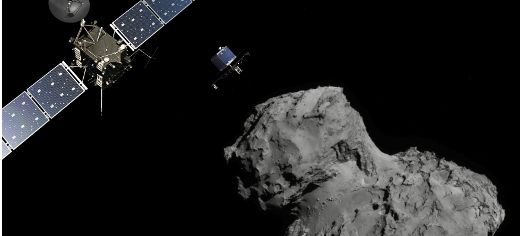
Today, the European Space Agency’s (ESA) Rosetta mission is attempting one of the most ambitious manoeuvres in space exploration: to soft-land a robotic probe on a comet for the first time.
Comet 67P/Churyumov–Gerasimenko has travelled from the outer-most region of the Solar System to about 580 million km from Earth (about halfway between the orbits of Mars and Jupiter). The mission could bring groundbreaking discoveries, as comets are a likely source of the Earth's oceans, as well as a source of compounds such as amino acids – the ‘building blocks of life’.
Professor John Plane, a member of the Atmospheric and Planetary Chemistry group at the University of Leeds, said: “We know that comets produce organic molecules, such as amino acids and peptides. The big question is whether they formed inside the nucleus of the comet and then evaporated, or formed through photochemical reactions on dust in the tail.
"If the former, then these relatively fragile molecules could have survived entry to the Earth’s atmosphere inside comets that made glancing impacts. If the latter, they would probably have been destroyed as shooting stars on entry.
“The really big result will be if Rosetta’s landing probe, which is called Philae, detects ‘chiral amino acids’ – amino acid molecules of identical composition but mirror images of each other – of which only one chiral form is found in biological systems on Earth."
Professor Plane will be giving the 2014 Bolton Lecture in Astronomy at the University of Leeds later today. The lecture will focus on comets as the source of most of the cosmic dust in the Solar System and the impacts of the roughly 100 tonnes of this dust which enters our atmosphere each day. Before the lecture begins, we should know if the probe has successfully landed on the comet.
On 7 November 2014, Professor Plane was also involved in research presented at a NASA press conference about the MAVEN probe that is currently in orbit around Mars. You can read more about this research in the University of Leeds press release.
Further information
The Bolton Lecture takes place on Wednesday, 12 November between 17:30 and 18:30 in Conference Auditorium 1 at the University of Leeds.
For interview requests please contact Sarah Reed, Press Officer at the University of Leeds, on 0113 34 34196 or email s.j.reed@leeds.ac.uk
Credit: ESA/ATG medialab; Comet image: ESA/Rosetta/Navcam
The image of the comet was taken with the navigation camera on Rosetta (ESA/Rosetta/NavCam).